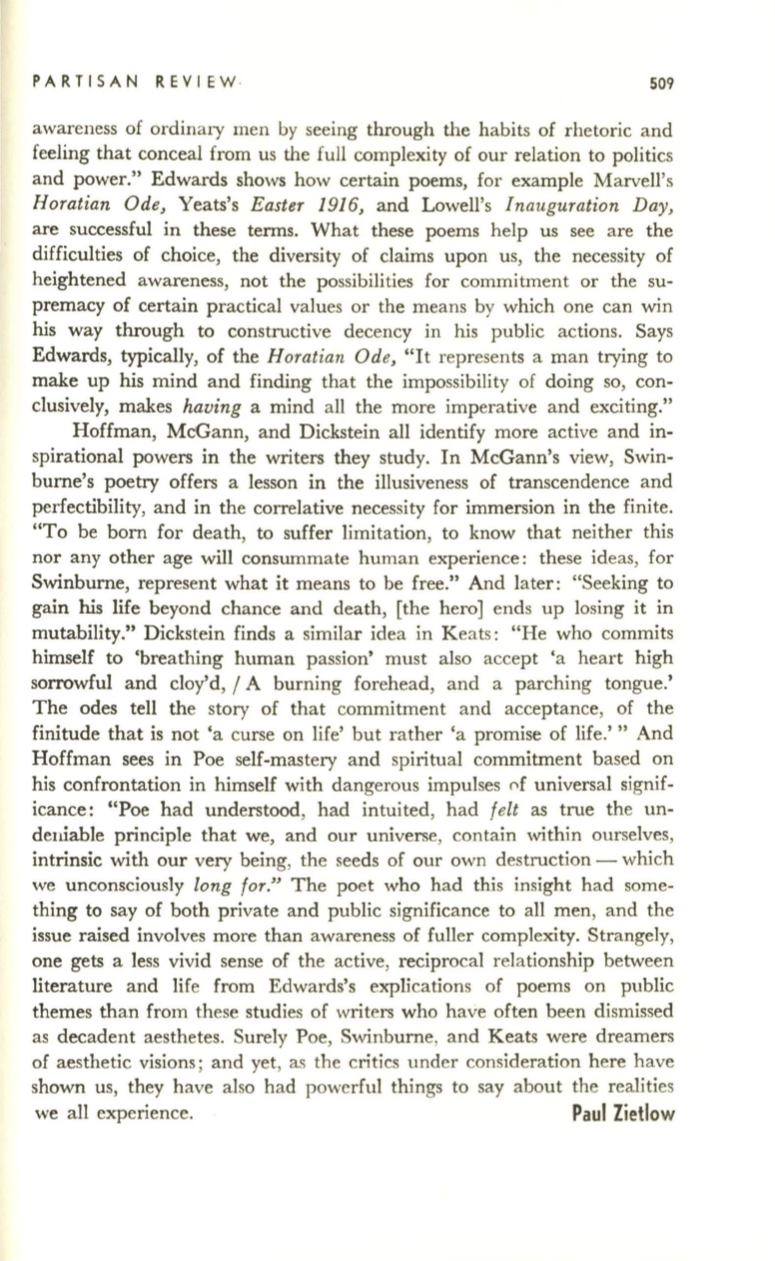
PARTISAN REVIEW ·
509
awareness of ordinary men by seeing through the habits of rhetoric and
feeling that conceal from us the full complexity of our relation to politics
and power." Edwards shows how certain poems, for example Marvell's
Horatian Ode,
Yeats's
Easter
1916, and Lowell's
Inauguration Day,
are successful in these tenns. What these poems help us see are the
difficulties of choice, the diversity of claims upon us, the necessity of
heightened awareness, not the possibilities for commitment or the su–
premacy of certain practical values or the means by which one can win
his way through to constructive decency in his public actions. Says
Edwards, typically, of the
Horatian Ode,
"It represents a man trying to
make up his mind and finding that the impossibility of doing so, con–
clusively, makes
having
a mind all the more imperative and exciting."
Hoffman, McGann, and Dickstein all identify more active and in–
spirational powers in the writers they study. In McGann's view, Swin–
burne's poetry offers a lesson in the illusiveness of transcendence and
perfectibility, and in the correlative necessity for immersion in the finite.
"To be born for death, to suffer limitation, to know that neither this
nor any other age will consummate human experience: these ideas, for
Swinburne, represent what it means to be free." And later: "Seeking to
gain his life beyond chance and death, [the hero] ends up losing it in
mutability." Dickstein finds a similar idea in Keats: "He who commits
himself to 'breathing human passion' must also accept 'a heart high
sorrowful and cloy'd, / A burning forehead, and a parching tongue.'
The odes tell the story of that commitment and acceptance, of the
finitude that is not 'a curse on life' but rather 'a promise of life.' " And
Hoffman sees in Poe self-mastery and spiritual commitment based on
his confrontation in himself with dangerous impulses f'f universal signif–
icance: "Poe had understood, had intuited, had
felt
as true the un–
deniable principle that we, and our universe, contain within ourselves,
intrinsic with our very being, the seeds of our own destruction - which
we unconsciously
long for."
The poet who had this insight had some–
thing to say of both private and public significance to all men, and the
issue raised involves more than awareness of fuller complexity. Strangely,
one gets a less vivid sense of the active, reciprocal relationship between
literature and life from Edwards's explications of poems on public
themes than from these studies of writers who have often been dismissed
as decadent aesthetes. Surely Poe, Swinburne, and Keats were dreamers
of aesthetic visions; and yet, as the critics under consideration here have
shown us, they have also had powerful things to say about the realities
we all experience.
Paul Zietlow


